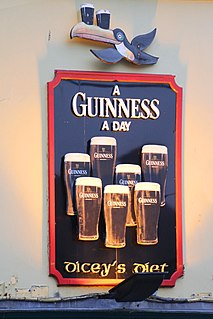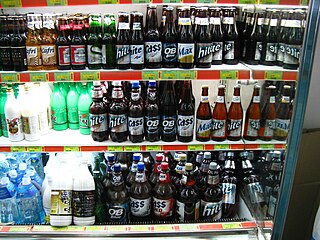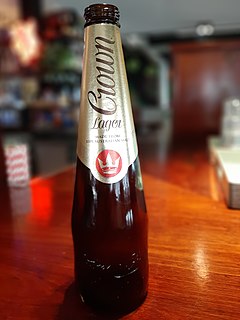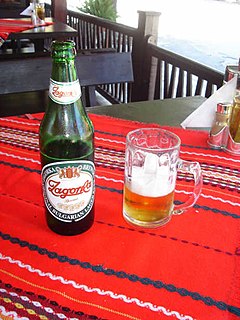This article needs additional citations for verification .(July 2022) |

Pirinsko Pivo is a brewery founded in 1969 in Blagoevgrad in SW Bulgaria.
This article needs additional citations for verification .(July 2022) |

Pirinsko Pivo is a brewery founded in 1969 in Blagoevgrad in SW Bulgaria.
Pirinsko is named after the nearby Pirin Mountains and is situated in Blagoevgrad, a city located 90 km south of the capital Sofia. The brewery substantially expanded in the last few years and has a market share of 12 percent today. The brewery produces filtered and carbonated lagers.
The main brand is Pirinsko, a standard lager which has an 8% share of the national market.
The beers are available in Bulgaria.

Beer is a popular beverage in Serbia.

Carlsberg A/S is a Danish multinational brewer. Founded in 1847 by J. C. Jacobsen, the company's headquarters is in Copenhagen, Denmark. Since Jacobsen's death in 1887, the majority owner of the company has been the Carlsberg Foundation. The company's flagship brand is Carlsberg. Other brands include Tuborg, Kronenbourg, Somersby cider, Holsten, Neptun, Russia's best-selling beer Baltika, Belgian Grimbergen, Fix, one of Greece's oldest brands and more than 500 local beers. The company employs around 41,000 people, primarily in Western Europe, Russia and Asia.

Kamenitza is one of the top-selling Bulgarian beer companies, alongside Heineken and Astika based in the city of Haskovo. It was established in 1881 and is currently owned by the multinational Molson Coors. The brewery has a wide variety of lager and dark beers. Its slogan is "Mazhete znayat zashto" which translates to "Men know why."
Nigerian Breweries Plc, is the largest brewing company in Nigeria. It serves the Nigerian market and West Africa.

Asahi Group Holdings, Ltd. is a Japanese global beer, spirits, soft drinks and food business group headquartered in Sumida, Tokyo.
Harbin Brewery is a Chinese brewery founded in 1900 in Harbin, China. As China's fourth largest brewery and its oldest one, it has a leading position in Northeast China and owns the Hapi beer brand.

Brazil is the world's third largest beer market with total volume at 139 million hectoliters, and per capita consumption 61 liters in 2016.
Beer in Africa, especially lager, is produced commercially in most African countries, and varieties of beer are also made by indigenous people. Beer is served in a range of locales, from neighbourhood shebeens to upscale bars. Many countries have standardized beer bottle sizes, which are cleaned and re-used, and so when buying beer at a store often people must pay a deposit on the bottle as well as the price of the beer. An alternative to glass-bottle beers is local beer sold in tetra-pak style paper cartons.

Brewing in Ireland has a long history. Production currently stands at over 8 million hectolitres, and approximately half the alcohol consumed is beer.

The beer market in Denmark is dominated by the brands Carlsberg and Tuborg. Since Tuborg was acquired by Carlsberg in 1970, Carlsberg has held a near-monopoly. A number of regional breweries, however, managed to survive, and most of them merged into Royal Unibrew in 2005. As of 2020, Ratebeer lists over 300 active breweries in Denmark, most of which are microbreweries.

Beer, called maekju in Korean, was first introduced to Korea in the early 20th century. Seoul's first beer brewery opened in 1908. Two current major breweries date back to the 1930s. The third brewery established in Korea, Jinro Coors Brewery, was founded in the 1990s. It was later acquired by Oriental Breweries (OB). Hite Breweries's former name was Chosun Breweries, which was established in 1933. The company changed its name to Hite Breweries in 1998. OB Breweries established as Showa Kirin Breweries in 1933. The company changed its name to OB Breweries in 1995.

East African Breweries Limited, commonly referred to as EABL, is a Kenyan-based holding company that manufactures branded beer, spirits, and non-alcoholic beverages.

Crown Lager is a 4.9% premium Australian beer originally made by Carlton & United Breweries (CUB), a subsidiary of Foster's Group. The beer was first brewed in 1919 under its former name, "Foster's Crown Lager".

The modern history of beer in Bulgaria dates back to the 19th century, when it was introduced to the country by foreigners shortly before the Liberation of Bulgaria. Until then, beer was practically unknown in what used to be a mainly rakia and wine-drinking country. Today, Bulgaria ranks 15th by beer consumption per capita, with 73 litres a year.
Heineken N.V. is a Dutch brewer which owns a worldwide portfolio of over 170 beer brands, mainly pale lager, though some other beer styles are produced. The two largest brands are Heineken and Tecate; though the portfolio includes Amstel, Fosters, Sagres, Cruzcampo, Skopsko, Affligem, Żywiec, Starobrno, Zagorka, Zlatý Bažant, Laško and Birra Moretti.

Beer in Slovenia is dominated by the pale lager market. The most commonly known brands of Slovenian beer, now united under the same parent company, are Laško and Union, although a number of smaller breweries exist.
Lion Brewery or Lion Brewery (Ceylon) PLC is a predominantly Sri Lankan owned and operated brewery. The company is listed on the Colombo Stock Exchange and its stock is part of the S&P Sri Lanka 20 Index. Lion Brewery produces the highest selling beer, Lion Lager, in both Sri Lanka and the Maldives.
Nile Breweries Limited (NBL) is the leading beer manufacturer in Uganda.

Brewing began in Sri Lanka in 1881 primarily to meet the needs of the colonial tea planters. Despite the country's tropical weather, the preferred beer styles have remained relatively unchanged, with strong stouts remaining popular.

Beer and alcohol is an integral part of Tanzanian society and local brands hold a strong sense of national pride among the Tanzanian population. There is a considerable amount of brewing and drinking done in the country. Tanzania ranks 6th in Africa for beer consumption and contributes to over 3% of the African consumption. However, over 90% of the national consumption is either homemade or from the informal sector. Bottled beer is expensive for the majority of the population and is almost 6 times more expensive than the maize beers. Nonetheless, beer sales and taxes are a vital part of the Tanzanian economy.